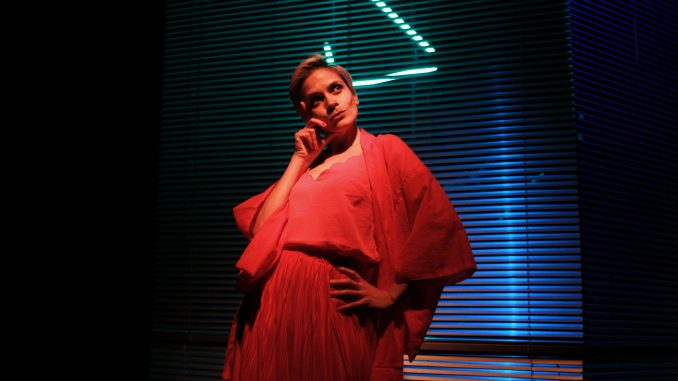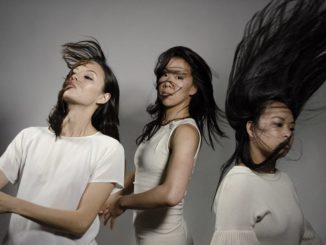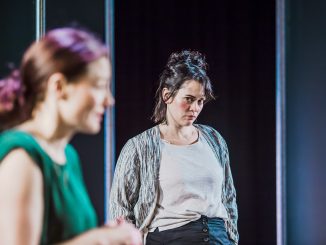
[Roots]
Can love transcend race? Is it better to have loved and lost your identity then not to have loved at all? These are just two of the poignant questions asked by Orientation, intelligently written and compellingly directed by Chye-Ling Huang. Against the backdrop of the legacy of colonialism that continues to inform racial politics in contemporary Aotearoa, Orientation is an honest, humorous and thought-provoking play that navigates questions of race, identity, sexual desire, and love.
Orientation is the latest offering of Proudly Asian Theatre (PAT) which was founded by Chye-Ling Huang and James Roque in 2013 to challenge the lack of Asian representation in New Zealand Theatre and Film. Not only do PAT offer audiences a play with intelligent, honest, human and relatable Asian characters, the production also interrogates how certain representations of ‘Asian’ or ‘Chinese’, reinforced and circulated in commercial popular culture, can be internalised, informing sexual desires and ultimately impacting negatively on intimate personal relationships.
Audiences arriving at the Q Theatre’s Loft encounter a minimalist set by Michael McCabe, incorporating two sets of window blinds – one hanging upstage right and another positioned centre stage left, and a few neon lights positioned at odd angles casting a red glow across the stage. A moment later the actor Kyle Chuen emerges dancing and twerking to the track ‘Made in China’ by the Chinese hip hop group Higher Brothers (Mix by DJ Snake, Geffen Records, 2018). This opening moment encapsulates an aesthetic for the production informed by Asian popular culture, booty-rap and commercial hip hop.
As a microphone is lowered to the stage from the ceiling, Chuen addresses the audience as a boxing announcer, welcoming the audience in a witty and wonderfully written extended monologue that sets the context and highlights some of the major currents underscoring the production. This includes the conflation of ‘Asian’ with ‘Chinese’, the history of Chinese migration to New Zealand, and the Asian stereotypes and representations that both terrify and fascinate the general Kiwi imagination. “We go way back” he tells us, “I dug gold, cut flax, and planted Kumara while you watched sweat drip from my back”. He tells the audience that he will be our ‘Asian Everyman’, a locus for our fears and desires and embodying some of the themes associated with being Asian in Aotearoa. Here the production explicitly highlights (and critiques) the importance of representation and popular culture in defining our expectations of what being ‘Asian’ can mean within the dominant culture of New Zealand, with the monologue referencing Jacky Chan, Steve Yeun, Ray Bhon, and even the current Mayor of Gisborne, Meng Liu Foon.
The Asian Everyman introduces us to the play’s protagonist Mei (Natasha Daniel), a bi-racial New Zealander with a Chinese father and Pakeha mother. Based loosely on writer/director Huang’s own life, Mei is so fair skinned she often ‘passes’ for being white, occupying a troubled middle-ground as a ‘Kiwi Asian’ in claiming connection to both her ‘Chinese’ and ‘White’ worlds but not completely belonging to either. She informs us that she is reminded of her racial difference when surrounded by White Kiwis who forget she is half-Chinese and make some racist gibe at Asians. Mei is looking for love and confesses that she has only dated white guys and wonders whether she has been influenced or prejudiced by the same racial stereotypes about Asian men that circulate in popular culture. She decides with the help of Everyman to look for love with an Asian man – to date Asian men exclusively, to ‘root herself back to her roots’. This is a story of someone trying to negotiate racial politics in contemporary Aotearoa in response to an identity crisis which makes her question whether love is enough to hold cross-racial relationships together.
The audience are introduced to three of Mei’s dates. The action is transported behind one of the blinds hanging in the space where we are eventually introduced to Dhruv (Mayen Mehta) a Malaysian-Indian aspiring film-maker who emerges from behind the ‘screen’ to discuss some of Mei’s favourite films. Dev is a screen-writer keen to challenge preconceived ideas of an Asian man as a love interest in a romantic role and insists that intercultural doesn’t just mean ‘white and other’. Eventually he meets a ‘white’ producer/director keen to make his film and throughout the play we see him struggle to resist or at least negotiate the producers attempts to ‘white wash’ his film. We are also introduced to Thomas (Eugene Yao) an aspiring Chinese Kiwi actor who dreams of auditioning for the Pop-up Globe. Thomas jokes with Mei after one of their love-making sessions that Asians are ageless and insists he is a vampire: “that’s why I don’t see images of myself reflected in the media” he quips. Lastly we meet Kace (Marwin Silerio) an aspiring Filipino body-builder who abruptly brakes off his relationship with Mei when he discovers that she is half-Chinese. Kace is later confronted by his sister (played by Chuen) who rebukes him for only dating white girls while severing his ties to culture and family. “You can’t fuck yourself white” his sister tells him, with the scene eloquently recalling and problematising Mei’s own troubling desire to exclusively date Asian men.
Each of the male characters reveal something about Mei’s hang-ups and sexual desires, informed by racialised notions of the ‘exotic’ and the ‘feminine’. In a powerful scene Mei is confronted by the various men in her life who accuse her: “You want love but not from us”. We also hear from Mei’s white boyfriend Jordan, played by the accomplished male cast, who beseeches Mei not to bow to cultural conventions or racial stereotypes and instead to “fight for love”. The male characters are three-dimensional and complex and the writing manages to capture the ebb, flow and rhythm of relationships, and the intimate back and forth conversation that can sometimes emerge post-coitus when vulnerabilities are disarmed and truths can often be more easily spoken – at times with unintended and even hurtful consequences.
There is a small sharp and funny scene where Mei asks Siri, the virtual assistant on the Apple iPhone, a series of questions about race: “Siri – where are you from? Where are you really from? What’s your ethnicity?”. This leads to a series of online searches of Asian lead actors ending with a search for Michael Fassbender from the X-Men movie franchise. The scene ends with Mei commanding Siri to “delete search history”. The scene eloquently highlights the role of consumer technology in propagating racial discourses that fetishize, exoticize and ultimately dehumanise racial groups such as ‘Asians’.
Given the importance of representation and popular culture in the play, one might have expected a profusion of multimedia and digital effects in the production. Refreshingly, the staging eschews reliance on the digital in favour of the analogue, utilising the physical skills of the actors for the characterisations and scene transitions, and relying on two soft puppets made by Paul Lewis to stage the story of Mei’s parents. At several key moments in the play, the loud hip hop base-beats give way to a series of more subdued scenes accompanied by the echoing and reverberating soft sounds of gongs and chimes (sound design by Emi Pogoni). In these scenes a Chinese dragon puppet tells the story of Mei’s father and how he met Mei’s mother who is staged with the less flattering ‘white bread’ puppet. We hear how Mei’s mother taught her father how to swim, how they fell in love, and how they married in defiance of cultural conventions. Ultimately this narrative thread involving Mei’s parents reveals a family breakdown which has precipitated Mei’s identity crisis and prompted her to question whether love can transcend race.
Orientation is an accomplished production supported by a very talented cast. There is an extended sequence at the beginning of the play involving the Asian Everyman donning masks of various Asian male celebrities that could easily be cut, but, apart from this, the play is beautifully written and structured. One aspect of the production that didn’t quite meet expectations was in the treatment of the sexual content of the play. Here the direction tended to off-set the sexual content with humour. This resulted in a couple of awkward scenes at the beginning of the play, one of which involved Mei simulating sex with a maneki-neko or Chinese lucky cat – those figurines in shop-windows that wave and are believed to bring good luck. Another instance involved Kace receiving fellatio from one of his white dates (played by Mehta in a blonde wig) followed by a foot job by another date (played by Yao). While there is a radical potential in humour to challenge normative gender roles and sexual preconceptions, the humour ultimately risked reducing the sexual content to immature frivolity. It might have been useful to a least glimpse Mei’s sexuality in an unapologetic portrayal – one which centres on her desire and passion to connect with others.
At one point in the play we hear the lines from Shakespeare’s play Romeo and Juliet : “My bounty is as boundless as the sea, My love as deep. The more I give to thee, The more I have, for both are infinite”. Orientation is smart and skilful art produced by a talented cast of bi-cultural and diasporic Asian artists. Each of these artists has probably experienced the pressure to adapt and ‘assimilate’ so as not to feel like an outsider. The problem is, the binaries of power that exist in Aotearoa – which are a legacy of colonialism – continue to mark those who are racially different as ‘the other’ and limit their contributions. It is for this reason that this play and the work of these artists and the company are so important. If love can transcend race than we need more work by these talented artists to show us how.
Orientation is presented by PAT and Q Matchbox and plays until 15 Sept.




Leave a Reply